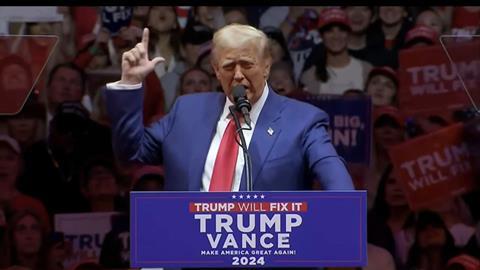Why US action will likely affect producers around the world
It has been a frenetic week for anyone whose business involves dealings across international borders.
Even for those whose output might not appear to be directly affected by the introduction of US tariffs - such as those involved in the commissioning and production of TV shows (a service, not a product) - the implications are beginning to be felt.
Firstly, the introduction of US tariffs is affecting almost every country’s economy directly (save for a handful of territories such as Russia, Cuba and North Korea, where US trade is minimal and tariffs/sanctions already ratcheted up).
And although the variable - but largely soaring - rates of tariffs unveiled on 2 April were pulled back to a more moderate 10% a week later (except for China), the effect of the uncertainty introduced is clear.
Tumbles and falls
Take a handful of US media giants, for example.
Warner Bros Discovery, Roku, Fox Corp and Disney saw more than $16bn (£12.3bn) wiped off their valuations in the immediate wake of the tariffs last week.

Most of those companies saw their valuations further eroded at the start of this week as investors fully assessed the potential impact on their earnings, and while the 10% tariff rate provided support, their valuations remain depressed.
Indeed, while WBD, Roku, Fox and Disney have all endured a bumpy ride over the past seven days, they are not ending on a high. Over the past month, WBD’s valuation is down 22%, Roku is off 15%, Disney has declined 13% and Fox is worth 6% less than it was in mid-March.
Amazon and Apple, whose streaming operations represent only a tiny part of their business, are also off 8% and 12% respectively.
It doesn’t look much brighter outside the US.
UK commercial broadcaster ITV is down 13.5% over the past month, France’s Canal+ has fallen almost 13% and Germany’s ProSiebenSat.1 - currently mired in the midst of dealing with its ongoing battle against MediaForEurope - has dropped 7.5%.
Pricing in a recession
This has implications for spending on programming but clearly, building a commissioning or production strategy on the fast-moving nature of such numbers would be a fool’s game. Adjusting that strategy might not be a bad idea, though.
Investors are fearful that tariffs will reduce global trade, cut consumer confidence and, in turn, cause a global recession.
And, as Sheridans’ head of TV and film Jeremy Roberts wrote in Broadcast International earlier this week, that means advertising budgets are at risk.
“In a recession, advertising budgets are among the first things to be cut,” he says, “and that hits media companies that rely on ad revenues and leads to a drop in commissioners’ budgets.”
Roberts adds that discretionary spending from consumers is also likely to fall, potentially impacting “second and third-tier streaming services”.
It is - perhaps - telling that the global streaming industry’s market leader Netflix has seen its share price fully rebound from the tariff hit (indeed, it is up almost 5% month-on-month).
Costanza Barrai, senior analyst for media at Global Data, adds that broadcasters and streamers ”face the challenge of balancing a compelling content offering to retain subscribers, with the added pressure to spend with caution.”
She adds that longer term effects could see production costs rise as the physical hardware required for filming such as cameras and monitors increase in price.
Trading for a deal
Barrai also points to the multifaceted approach that US president Donald Trump and his team might employ when negotiating trade deals, fuelled by his belief that some US companies are unfairly disadvantaged because of local regulation.

It is little surprise then that the European Union’s Audiovisual Media Services Directive (AVMSD) - which allows countries to regulate streamers and impose local spending levies - seems to be in the cross-hairs.
And the risk is being taken seriously: Olivier Henrard, deputy managing director at France’s National Centre of Cinema (CNC), called on Europeans to unite against new US “threats” at Series Mania Forum last month.
But negotiations, even with Trump, are still a two-way process, says Barrai, pointing to Chinese actions on US films earlier this week.
“In response to the heavy tariffs imposed by Trump to pressure China into striking a deal, the China Film Association cut the number of US films allowed to enter the country,” she says, a development covered by Broadcast International’s sister title Screen earlier this week.
Such a complex and fast-changing situation is arguably impossible to manage or navigate, but there is at least one clear takeaway from all of the above.
Uncertainty has soared over recent months and, for an industry already facing pressures in many parts of the world, so has the pressure on ROI. For those with shows that require an appetite for risk, the chances of success have diminished even further.








No comments yet